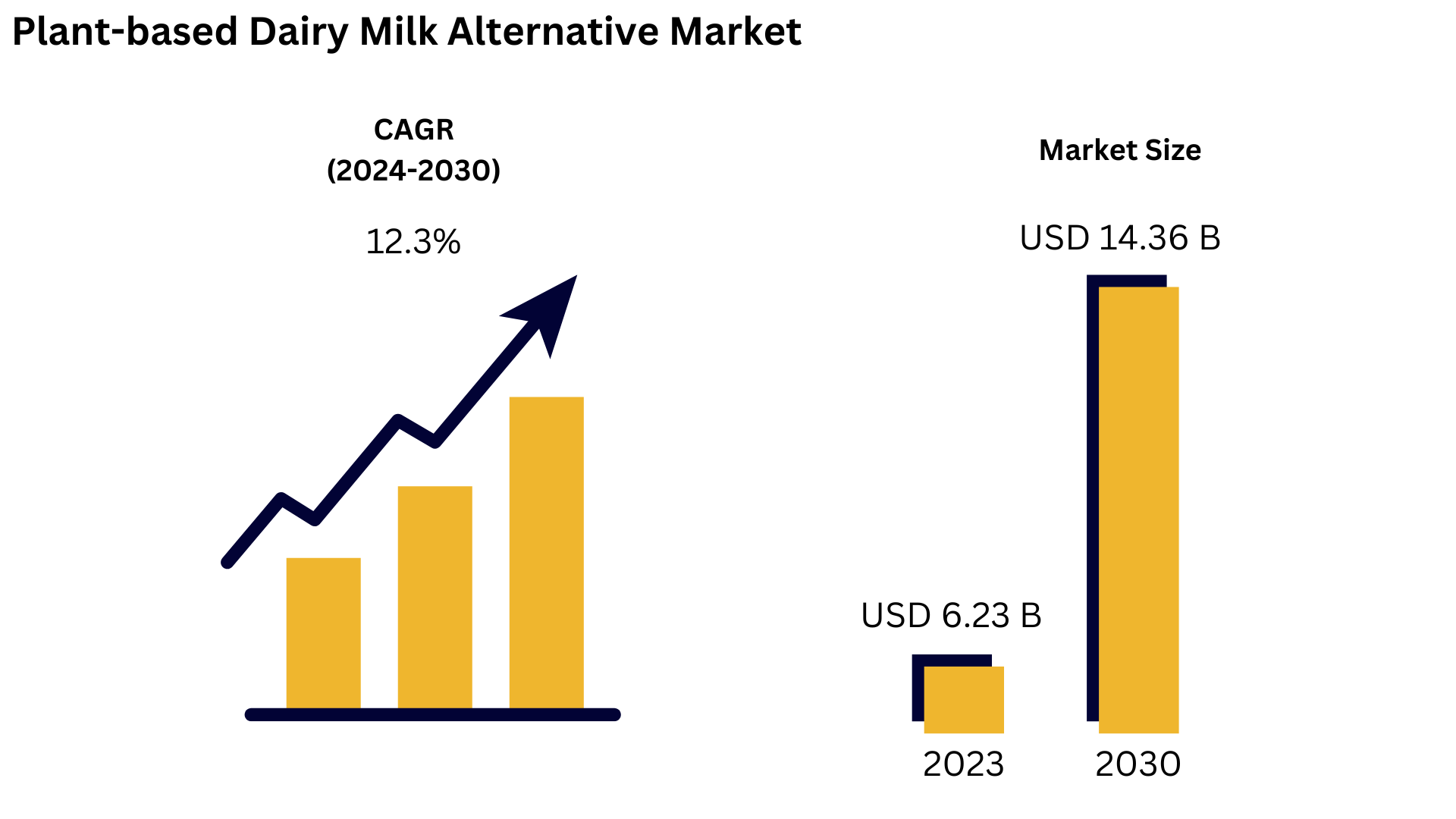Market Size and Growth:
- Market value in 2023: USD 6.23 billion.
- Projected market value by 2030: USD 14.36 billion.
- Compound Annual Growth Rate (CAGR): 12.3% from 2024 to 2030.
Market Trends:
- Increasing consumer preference for plant-based and vegan diets.
- Rising awareness of lactose intolerance and dairy allergies.
- Growth in demand for sustainable and environmentally friendly products.
Drivers:
- Health benefits associated with plant-based milk alternatives.
- Growing environmental concerns and the desire to reduce carbon footprints.
- Expansion of product varieties, including almond, soy, oat, coconut, and rice milk.
Opportunities:
- Innovation in flavors and nutritional enhancements to attract a broader consumer base.
- Expansion into emerging markets with increasing health-conscious consumers.
- Development of fortified plant-based milk alternatives with added vitamins and minerals.
Market Segmentation:
- By type: Almond milk, Soy milk, Oat milk, Coconut milk, Rice milk, Others.
- By distribution channel: Supermarkets/hypermarkets, Online retail, Convenience stores, Specialty stores, Others.
Regional Insights:
- North America and Europe are leading markets due to high levels of health consciousness and established plant-based product industries.
- Asia-Pacific is expected to witness significant growth, driven by increasing awareness of plant-based diets and rising disposable incomes.
- Latin America and the Middle East & Africa present opportunities for market expansion as consumer preferences evolve.
Challenges:
- Higher production costs and pricing compared to traditional dairy milk.
- Consumer skepticism about taste and nutritional content of plant-based alternatives.
- Regulatory hurdles and labeling requirements in different regions.
Competitive Landscape:
- Key players are focusing on product innovation and diversification to cater to varying consumer preferences.
- Strategic partnerships, mergers, and acquisitions to enhance market presence and distribution networks.
- Emphasis on marketing and awareness campaigns highlighting the health and environmental benefits of plant-based milk alternatives.
Impact of External Factors:
- COVID-19: Increased health awareness during the pandemic boosted the demand for plant-based milk alternatives.
- Climate Change: Greater emphasis on reducing dairy farming's environmental impact is driving consumer shift towards plant-based options.
Future Outlook:
- Continued expansion of the plant-based milk segment with advancements in taste, texture, and nutritional profiles.
- Potential for innovations such as lab-grown milk and enhanced fortification to meet diverse dietary needs.
- Integration of technology and sustainable practices in production processes to appeal to eco-conscious consumers.
The USA market for Global Plant-based Dairy Milk Alternative market is estimated to increase from USD million in 2023 to reach USD million by 2030, at a CAGR during the forecast period of 2023 through 2030.
The China market for Global Plant-based Dairy Milk Alternative market is estimated to increase from USD million in 2023 to reach USD million by 2030, at a CAGR during the forecast period of 2023 through 2030.
The Europe market for Global Plant-based Dairy Milk Alternative market is estimated to increase from USD million in 2023 to reach USD million by 2030, at a CAGR during the forecast period of 2023 through 2030.

Report Overview
This report provides a deep insight into the global Plant-based Dairy Milk Alternative market covering all its essential aspects. This ranges from a macro overview of the market to micro details of the market size, competitive landscape, development trend, niche market, key market drivers and challenges, SWOT analysis, value chain analysis, etc.
The analysis helps the reader to shape the competition within the industries and strategies for the competitive environment to enhance the potential profit. Furthermore, it provides a simple framework for evaluating and accessing the position of the business organization. The report structure also focuses on the competitive landscape of the Global Plant-based Dairy Milk Alternative Market, this report introduces in detail the market share, market performance, product situation, operation situation, etc. of the main players, which helps the readers in the industry to identify the main competitors and deeply understand the competition pattern of the market.
In a word, this report is a must-read for industry players, investors, researchers, consultants, business strategists, and all those who have any kind of stake or are planning to foray into the Plant-based Dairy Milk Alternative market in any manner.
Global Plant-based Dairy Milk Alternative Market: Market Segmentation Analysis
The research report includes specific segments by region (country), manufacturers, Type, and Application. Market segmentation creates subsets of a market based on product type, end-user or application, Geographic, and other factors. By understanding the market segments, the decision-maker can leverage this targeting in the product, sales, and marketing strategies. Market segments can power your product development cycles by informing how you create product offerings for different segments.
Key Company
- Theppadungporn Coconut
- ThaiCoconut
- Asiatic Agro Industry
- PT. Sari Segar Husada
- SOCOCO
- Ahya Coco Organic Food Manufacturing
- Heng Guan Food Industrial
- WhiteWave Foods
- Coconut Palm Group
- Betrimex
- Goya Foods
- Renuka Holdings
- HolistaTranzworld
- UNICOCONUT
- Pacific Foods
- Blue Diamond Growers
- Milkadamia
- Califia Farms
- Oatly
- Rise Brewing
- Happy Planet Foods
- Thrive Market
- PepsiCo
Market Segmentation (by Type)
- Oat Milk
- Coconut Milk
- Almond Milk
- Other
Market Segmentation (by Application)
- Direct Drink
- Dairy & Dessert
- Baked Products
- Others
By Source Type
- Soy
- Almond
- Coconut
- Rice
- Oats
- Hemp
- Cashew
- Others (Macadamia, Hazelnut, Pea, etc.)
By Type
By Packaging
- Cartons
- Bottles
- Cans
- Pouches
- Others (Tetra Packs, Glass Bottles, etc.)
By Distribution Channel
- Supermarkets/Hypermarkets
- Convenience Stores
- Online Retailers
- Specialty Stores
- Others (Direct Sales, Health Food Stores, etc.)
Geographic Segmentation
- North America (USA, Canada, Mexico)
- Europe (Germany, UK, France, Russia, Italy, Rest of Europe)
- Asia-Pacific (China, Japan, South Korea, India, Southeast Asia, Rest of Asia-Pacific)
- South America (Brazil, Argentina, Columbia, Rest of South America)
- The Middle East and Africa (Saudi Arabia, UAE, Egypt, Nigeria, South Africa, Rest of MEA)
Key Benefits of This Market Research:
- Industry drivers, restraints, and opportunities covered in the study
- Neutral perspective on the market performance
- Recent industry trends and developments
- Competitive landscape & strategies of key players
- Potential & niche segments and regions exhibiting promising growth covered
- Historical, current, and projected market size, in terms of value
- In-depth analysis of the Plant-based Dairy Milk Alternative Market
Key Reasons to Buy this Report:
- Access to date statistics compiled by our researchers. These provide you with historical and forecast data, which is analyzed to tell you why your market is set to change
- This enables you to anticipate market changes to remain ahead of your competitors
- You will be able to copy data from the Excel spreadsheet straight into your marketing plans, business presentations, or other strategic documents
- The concise analysis, clear graph, and table format will enable you to pinpoint the information you require quickly
- Provision of market value (USD Billion) data for each segment and sub-segment
- Indicates the region and segment that is expected to witness the fastest growth as well as to dominate the market
- Analysis by geography highlighting the consumption of the product/service in the region as well as indicating the factors that are affecting the market within each region
- Competitive landscape which incorporates the market ranking of the major players, along with new service/product launches, partnerships, business expansions, and acquisitions in the past five years of companies profiled
- Extensive company profiles comprising of company overview, company insights, product benchmarking, and SWOT analysis for the major market players
- The current as well as the future market outlook of the industry concerning recent developments which involve growth opportunities and drivers as well as challenges and restraints of both emerging as well as developed regions
- Includes in-depth analysis of the market from various perspectives through Porters five forces analysis
- Provides insight into the market through Value Chain
- Market dynamics scenario, along with growth opportunities of the market in the years to come
- 6-month post-sales analyst support
Chapter Outline
Chapter 1 mainly introduces the statistical scope of the report, market division standards, and market research methods.
Chapter 2 is an executive summary of different market segments (by region, product type, application, etc), including the market size of each market segment, future development potential, and so on. It offers a high-level view of the current state of the Plant-based Dairy Milk Alternative Market and its likely evolution in the short to mid-term, and long term.
Chapter 3 makes a detailed analysis of the market's competitive landscape of the market and provides the market share, capacity, output, price, latest development plan, merger, and acquisition information of the main manufacturers in the market.
Chapter 4 is the analysis of the whole market industrial chain, including the upstream and downstream of the industry, as well as Porter's five forces analysis.
Chapter 5 introduces the latest developments of the market, the driving factors and restrictive factors of the market, the challenges and risks faced by manufacturers in the industry, and the analysis of relevant policies in the industry.
Chapter 6 provides the analysis of various market segments according to product types, covering the market size and development potential of each market segment, to help readers find the blue ocean market in different market segments.
Chapter 7 provides the analysis of various market segments according to application, covering the market size and development potential of each market segment, to help readers find the blue ocean market in different downstream markets.
Chapter 8 provides a quantitative analysis of the market size and development potential of each region and its main countries and introduces the market development, future development prospects, market space, and capacity of each country in the world.
Chapter 9 introduces the basic situation of the main companies in the market in detail, including product sales revenue, sales volume, price, gross profit margin, market share, product introduction, recent development, etc.
Chapter 10 provides a quantitative analysis of the market size and development potential of each region in the next five years.
Chapter 11 provides a quantitative analysis of the market size and development potential of each market segment (product type and application) in the next five years.
Chapter 12 is the main points and conclusions of the report.

